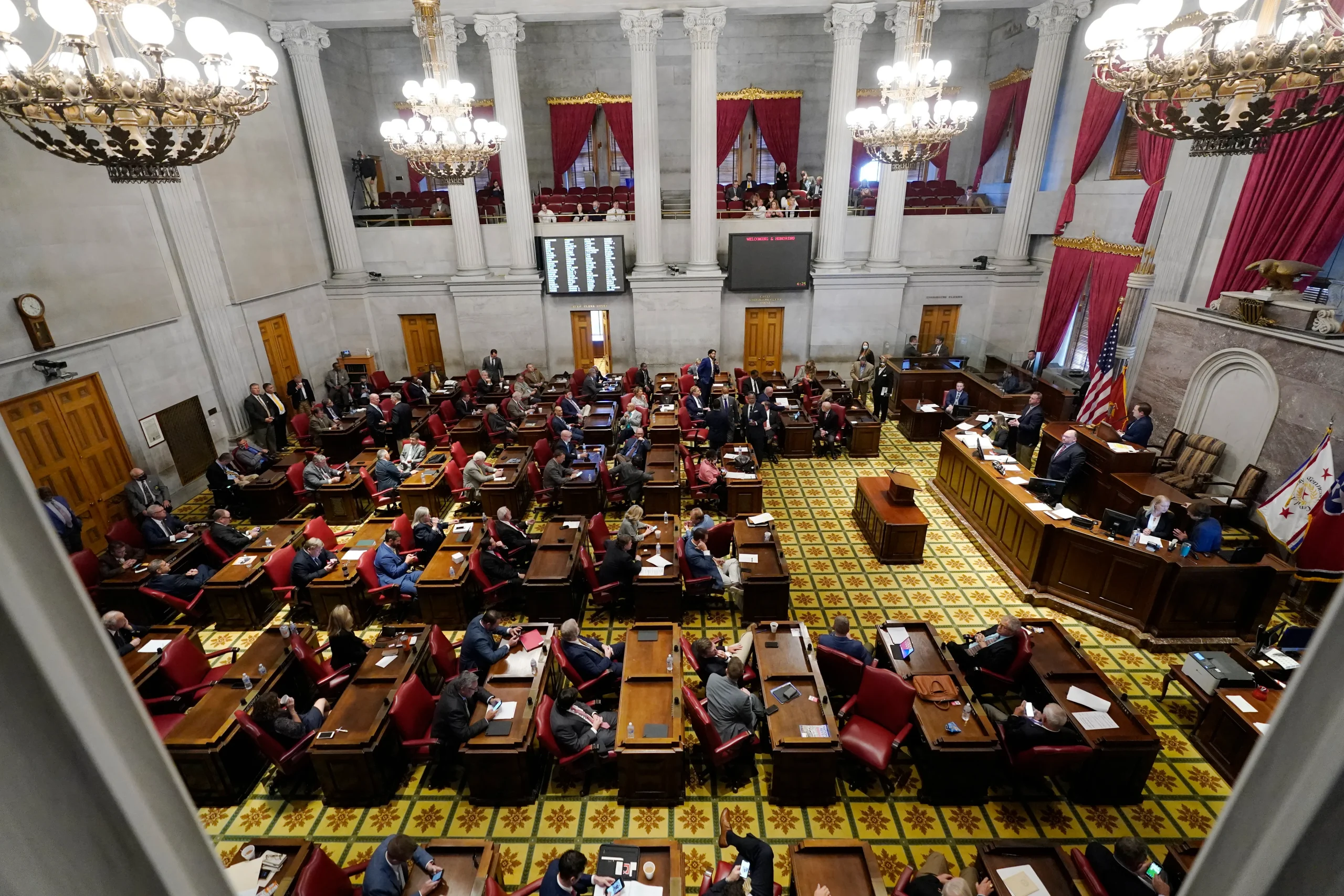A political figure currently seeking a seat in the U.S. House of Representatives has drawn attention due to a resurfaced video showing her dramatic removal from a state legislative session several years ago. The footage, originally from May 2019, depicts the candidate screaming in protest at the Tennessee state Legislature, demanding resignations from elected officials over allegations of misconduct. The incident has resurfaced as the candidate campaigns in Tennessee’s 7th District, highlighting both her activist roots and the intense scrutiny that comes with running for national office.
In the video, the candidate, Aftyn Behn, can be seen yelling at security and legislative leaders, insisting that officials step down for what she described as failures to hold individuals accountable. According to The Tennessee Holler, Behn directed her protests at then-Republican state Representative David Byrd and former Tennessee House Speaker Glen Casada. Her shouting included repeated calls for their resignations, as she criticized their handling of allegations of sexual assault made against Byrd by multiple women.
“I’m here today on behalf of communities that you have silenced today in this legislative session,” Behn yelled, according to the footage. “You have been violent to our various communities this entire legislative session. You have stopped any accountability! You have been taken out! You have been violent and extreme towards people of color, towards women, towards minorities! You have failed! This is unacceptable behavior! You shouldn’t do this! You have to resign!”
Behn’s removal from the chamber was enforced by security personnel, and she was later cited and released from police custody that evening, as reported by News Channel 5 Nashville. The incident occurred amid a broader activist effort at the time, during which Behn and other members of the group Enough is Enough protested Byrd’s continued service following accusations of inappropriate conduct when he coached basketball. Although Byrd denied wrongdoing and was never charged, the allegations drew widespread media attention and public criticism, forming the backdrop for Behn’s impassioned protest.
The May 2019 incident was not Behn’s first high-profile confrontation with political leaders in Tennessee. A month prior, she attempted to enter the office of Republican Governor Bill Lee to request that he call for Byrd’s resignation, but was forcibly escorted out by security. These incidents underscore a history of activism and direct action that has defined Behn’s public persona, reflecting a willingness to challenge established authority and engage in confrontational forms of political expression.
Behn’s campaign for Congress is now underway, as she seeks to represent Tennessee’s 7th District. She is running against Republican Matt Van Epps, a former commissioner in Governor Lee’s administration. The district itself is politically competitive, and Behn’s history as an activist and outspoken critic of the state’s political establishment has become a focal point of public discussion.
Beyond her protests against Byrd, Behn has made numerous statements that have stirred debate within the state and nationally. On the “Year Old GRITS” podcast in February 2020, she expressed frustration with Nashville, and in 2023, she referred to Tennessee as a “godforsaken” state. These remarks highlight a pattern of vocal criticism that some supporters view as courageously honest, while detractors interpret it as inflammatory.
Behn’s broader platform includes positions that reflect progressive and sometimes controversial policy perspectives. She has described college sororities as “a staple of white supremacy,” criticized aspects of state governance for failing marginalized communities, and expressed support for taxpayer-funded medical procedures for transgender minors. These policy stances, combined with her activist history, contribute to a public image of Behn as a fiercely ideological and uncompromising candidate.
WATCH:
Her outburst in the Tennessee Legislature also raises questions about the intersection of activism and decorum in government settings. Advocates for direct action note that her protest drew attention to alleged misconduct that might otherwise have gone unaddressed. Critics argue that the dramatic nature of her conduct, particularly the screaming and defiance of legislative protocol, undermines the seriousness of her advocacy and casts doubt on her temperament as a future lawmaker.
The broader context of her 2019 protest involves not just her personal convictions but also ongoing debates about accountability in politics. Byrd’s alleged misconduct, while never resulting in charges, exemplified the challenges of addressing sexual assault allegations against public figures, particularly in settings where power dynamics complicate transparency. Behn’s activism at the time tapped into national conversations about #MeToo, public accountability, and the role of protest in effecting political change.
Behn’s candidacy has drawn national attention not solely because of the resurfaced video but also due to her unconventional campaign style. Her approach combines grassroots organizing with social media engagement and public statements that are often provocative. In doing so, she reflects a broader trend in contemporary politics, where candidates leverage media attention to amplify their message, even when it courts controversy.
Observers note that her style is polarizing. Supporters argue that her commitment to confronting systemic issues, whether in the form of sexual misconduct allegations or broader societal inequities, demonstrates courage and a willingness to prioritize principle over politeness. Opponents contend that her approach could hinder legislative effectiveness, particularly if confrontational tactics overshadow collaboration and negotiation, which are key to functioning in Congress.
The candidate’s record as an activist, including participation in Enough is Enough, underscores a longstanding focus on civil rights and social justice. These efforts, while controversial to some, illustrate a consistent engagement with causes aimed at protecting vulnerable populations and ensuring political accountability. Whether these credentials translate into electoral success in a competitive district remains to be seen.
Behn’s confrontation in the legislature also highlights the changing expectations of political behavior and the role of public protest. In recent years, activists and candidates alike have pushed boundaries, testing the line between civil disobedience and institutional decorum. Her actions in 2019 reflect the tension between these spheres, providing a case study in how public figures navigate both personal conviction and public accountability.
In addition to her activist and policy positions, Behn’s statements about Tennessee’s political and cultural environment have sparked discussion about regional perceptions and political identity. By labeling her home state with sharply critical language, she invites dialogue about systemic issues while simultaneously generating controversy. This tactic can energize a campaign’s base but also risks alienating moderate and undecided voters.
As the 2025 congressional race approaches, Behn’s past actions and statements will likely continue to influence public perception. The resurfaced video, while years old, provides a vivid illustration of her confrontational style and dedication to protest. It also offers insight into the ways in which activism and politics intersect, raising questions about the balance between passion and professionalism in elected office.
Her candidacy also prompts broader reflection on the expectations placed upon women in politics. Behn’s vocal and confrontational style challenges traditional notions of decorum, particularly for female candidates, and forces a conversation about how assertiveness is perceived differently depending on gender. While some view her as a trailblazer unafraid to speak truth to power, others interpret her behavior as erratic or unprofessional.
The role of protest in political campaigns is further complicated by media coverage. In Behn’s case, the video circulating from 2019 provides an enduring visual narrative of her commitment to holding officials accountable. The media’s role in framing this event—whether as evidence of activism or as a political liability—illustrates the power of documentation in shaping public perception, particularly in an age of instant and widespread information sharing.
As the election season continues, both Behn and her opponents will likely grapple with the implications of her activist history. While her advocacy has won her supporters who value boldness and principle-driven action, it also provides fodder for critics seeking to question her temperament and suitability for legislative responsibilities. The tension between these perspectives underscores the complexity of modern campaigns, where past actions, statements, and public persona are inextricably linked to voter decisions.
Ultimately, Behn’s political journey reflects a blend of activism, controversy, and ambition. Her 2019 legislative outburst serves as a reminder of the intensity of her convictions, while her ongoing campaign highlights the challenges of translating activism into electoral success. Regardless of the outcome, her candidacy offers a window into the evolving nature of political engagement and the ways in which public figures navigate scrutiny, advocacy, and electoral competition.
As Tennessee voters prepare to head to the polls, the debate surrounding Behn’s candidacy will likely continue to focus on her activist past, policy positions, and the broader questions her campaign raises about political courage, decorum, and the role of protest in shaping legislative and electoral outcomes. Her story serves as a compelling example of how activism intersects with politics, and how past actions can reverberate years later, influencing both public perception and electoral strategy.
Aftyn Behn’s campaign is more than a bid for office; it is a lens through which to examine the dynamics of protest, political accountability, and the role of individual conviction in shaping public discourse. The resurfaced footage of her screaming in the Tennessee state Legislature remains a powerful reminder of the passion and intensity she brings to her work—an intensity that will continue to define her candidacy as she vies for a seat in Congress.

Emily Johnson is a critically acclaimed essayist and novelist known for her thought-provoking works centered on feminism, women’s rights, and modern relationships. Born and raised in Portland, Oregon, Emily grew up with a deep love of books, often spending her afternoons at her local library. She went on to study literature and gender studies at UCLA, where she became deeply involved in activism and began publishing essays in campus journals. Her debut essay collection, Voices Unbound, struck a chord with readers nationwide for its fearless exploration of gender dynamics, identity, and the challenges faced by women in contemporary society. Emily later transitioned into fiction, writing novels that balance compelling storytelling with social commentary. Her protagonists are often strong, multidimensional women navigating love, ambition, and the struggles of everyday life, making her a favorite among readers who crave authentic, relatable narratives. Critics praise her ability to merge personal intimacy with universal themes. Off the page, Emily is an advocate for women in publishing, leading workshops that encourage young female writers to embrace their voices. She lives in Seattle with her partner and two rescue cats, where she continues to write, teach, and inspire a new generation of storytellers.









